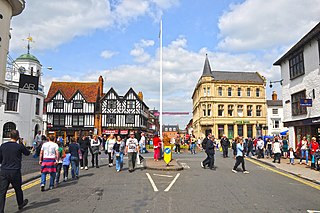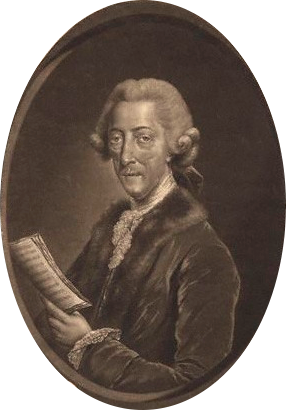Related Research Articles

William Shakespeare was an English playwright, poet and actor. He is widely regarded as the greatest writer in the English language and the world's pre-eminent dramatist. He is often called England's national poet and the "Bard of Avon". His extant works, including collaborations, consist of some 39 plays, 154 sonnets, three long narrative poems and a few other verses, some of uncertain authorship. His plays have been translated into every major living language and are performed more often than those of any other playwright. Shakespeare remains arguably the most influential writer in the English language, and his works continue to be studied and reinterpreted.

Stratford-upon-Avon, commonly known as just Stratford, is a market town and civil parish in the Stratford-on-Avon district, in the county of Warwickshire, in the West Midlands region of England. It is situated on the River Avon, 91 miles (146 km) north-west of London, 22 miles (35 km) south-east of Birmingham and 8 miles (13 km) south-west of Warwick. The town is the southernmost point of the Arden area at the northern extremity of the Cotswolds. In the 2021 census Stratford had a population of 30,495.

Thomas Augustine Arne was an English composer. He is best known for his patriotic song "Rule, Britannia!" and the song "A-Hunting We Will Go", the latter composed for a 1777 production of The Beggar's Opera, which has since become popular as a folk song and a nursery rhyme. Arne was a leading British theatre composer of the 18th century, working at the West End's Drury Lane and Covent Garden. He wrote many operatic entertainments for the London theatres and pleasure gardens, as well as concertos, sinfonias, and sonatas.

David Garrick was an English actor, playwright, theatre manager and producer who influenced nearly all aspects of European theatrical practice throughout the 18th century, and was a pupil and friend of Samuel Johnson. He appeared in several amateur theatricals, and with his appearance in the title role of Shakespeare's Richard III, audiences and managers began to take notice.

The Royal Shakespeare Company (RSC) is a major British theatre company, based in Stratford-upon-Avon, Warwickshire, England. The company employs over 1,000 staff and opens around 20 productions a year. The RSC plays regularly in London, Stratford-upon-Avon, and on tour across the UK and internationally.
This article contains information about the literary events and publications of 1769.

James Orchard Halliwell-Phillipps was an English Shakespearean scholar, antiquarian, and a collector of English nursery rhymes and fairy tales.

The Comedy of Errors is one of William Shakespeare's early plays. It is his shortest and one of his most farcical comedies, with a major part of the humour coming from slapstick and mistaken identity, in addition to puns and word play. It has been adapted for opera, stage, screen and musical theatre numerous times worldwide. In the centuries following its premiere, the play's title has entered the popular English lexicon as an idiom for "an event or series of events made ridiculous by the number of errors that were made throughout".

Anne Shakespeare was the wife of William Shakespeare, an English poet, playwright and actor. They were married in 1582, when Hathaway was 26 years old and Shakespeare was 18. She outlived her husband by seven years. Very little is known about her life beyond a few references in legal documents. Her personality and relationship to Shakespeare have been the subject of much speculation by many historians and writers.

Bardolatry is excessive admiration of William Shakespeare. Shakespeare has been known as "the Bard" since the eighteenth century. One who idolizes Shakespeare is known as a bardolator. The term bardolatry, derived from Shakespeare's sobriquet "the Bard of Avon" and the Greek word latria "worship", was coined by George Bernard Shaw in the preface to his collection Three Plays for Puritans published in 1901. Shaw professed to dislike Shakespeare as a thinker and philosopher because Shaw believed that Shakespeare did not engage with social problems as Shaw did in his own plays.
Guy Anthony Woolfenden was an English composer and conductor. He was head of music at the Royal Shakespeare Company in Stratford-upon-Avon for 37 years, making music an integral part of over 150 productions there. He completed scores for the full canon of Shakespeare plays.

Thousands of performances of William Shakespeare's plays have been staged since the end of the 16th century. While Shakespeare was alive, many of his greatest plays were performed by the Lord Chamberlain's Men and King's Men acting companies at the Globe and Blackfriars Theatres. Among the actors of these original performances were Richard Burbage, Richard Cowley, and William Kempe.
Events from the year 1769 in Great Britain. This year sees several key events in the Industrial Revolution.

William Shakespeare has been commemorated in a number of different statues and memorials around the world, notably his funerary monument in Stratford-upon-Avon ; a statue in Poets' Corner in Westminster Abbey, London, designed by William Kent and executed by Peter Scheemakers (1740); and a statue in New York's Central Park by John Quincy Adams Ward (1872).
The White Lion Inn was a public house located in Henley Street, Stratford-upon-Avon, England, an example of Elizabethan architecture that first appears in historical records in 1591. The building was mentioned by both Harriet Beecher Stowe and Rupert Graves.
John Huckell (1729–1771), was an English poet.

The Shakespeare Jubilee was staged in Stratford-upon-Avon between 6 and 8 September 1769. The jubilee was organised by the actor and theatre manager David Garrick to celebrate the Jubilee of the birth of William Shakespeare. It had a major impact on the rising tide of bardolatry that led to Shakespeare's becoming established as the English national poet. Thomas Arne composed the song Soft Flowing Avon for the Jubilee.

The Jubilee is a 1769 play by the British playwright and actor-manager David Garrick, with music by Charles Dibdin. It was based on his Shakespeare Pageant which he had originally planned to stage during the Shakespeare Jubilee in Stratford-upon-Avon until heavy rain forced it to be abandoned. It was first performed at the Drury Lane Theatre on 14 October 1769 and proved a major success, running for ninety performances. This allowed Garrick to recoup much of the money he had spent on the Jubilee celebrations.
The Shakespeare Club of Stratford-upon-Avon is a society based in Stratford-upon-Avon, England, that celebrates the life and literary works of William Shakespeare. It is the oldest Shakespeare society in the world, having been in existence since 1824. It now meets monthly between October and May at the Shakespeare Institute, for a series of lectures on a wide range of Shakespeare-related subjects.

Stratford-upon-Avon Town Hall is a municipal building in Sheep Street, Stratford-upon-Avon, Warwickshire. It is a Grade II* listed building.
References
- Shaughnessy, Robert (ed.). The Cambridge Companion to Shakespeare and Popular Culture. Cambridge University Press, 2007.